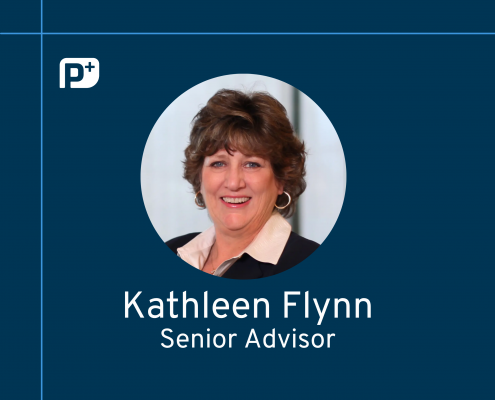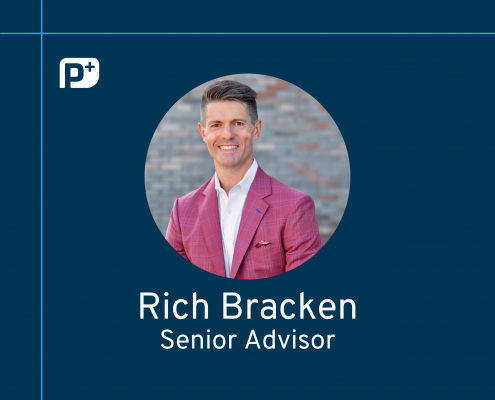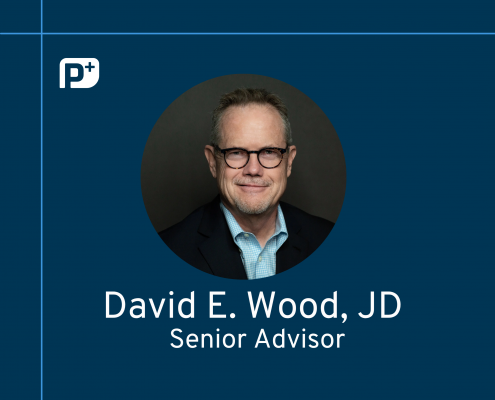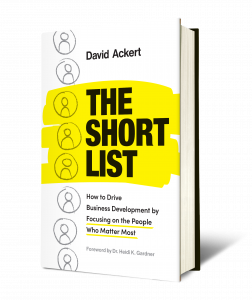“An Entrepreneurial Approach to Firm Growth” with Marianne Talbot
Marianne Talbot, Chief Marketing and Business Development Officer at Bailey & Glasser LLP recently joined David Ackert on The Market Leaders Podcast where she discussed her unique entrepreneurial approach to growing a law firm.
Marianne is a lawyer, turned entrepreneur, turned law firm CMBDO at a law firm. David asked her to talk about her career path.
An Unusual Trajectory
Marianne began by saying she has a unique background in the legal marketing space. She was a trial lawyer for 14 years, and worked with and was trained by one of the world’s most famous lawyers, who won Loving v. Virginia, 388 U.S. 1 (1967). She said, “For me, it was learning how to step out from under his shadow and think about business development and marketing before that even existed in law firms.”
Marianne also became an adjunct law professor at two law schools in D.C., then moved back to Manhattan after 9/11, where her mother still lived. There, she founded her own company. She shared, “I became an entrepreneur during the recession that started in 2008, and really ended up getting what I call an MBA on the street – learning how to run a business and capture people’s attention before the days of massive social media, when you’d walk down the street, and the stores were closing left and right.”
She continued, “And then I became an adoptive mother, the hardest job ever. I was a stay-at-home mom for two and a half years and then went back in-house to different law firms and legal entities, including a commercial litigation funding company. So, when I talk about business development and marketing, I know it from both sides – from being a practicing lawyer doing complex commercial litigation on very high-profile cases, and from pushing marketing initiatives and supporting lawyers who are working on their careers in their firms.”
She explained that Bailey & Glasser, where she now serves as CMBDO in their D.C. office, is an entrepreneurial firm, which she said is “very much out of the kind of book that I came out of.”
David noted that Marianne’s story demonstrates that she has the capacity both to hustle and to pivot and added that he assumes she brings that to her firm.
Getting Comfortable with ‘Hustle’
Marianne commented, “I love that you said hustle and pivot because those are two major themes in my career and my life. In fact, I have a sign on my wall detailing hustle nutrition facts and the serving size is one dream.”
She continued, “I like the word hustle because a lot of leaders say they don’t want a hustle and grind culture because it’s too hard. But honestly, I think people don’t hustle enough. It’s so easy for human beings to reach for different excuses why we don’t create what we could create. They make excuses, get distracted, procrastinate and blame others. But I feel we should have more hustle culture because that’s where the magic is.”
David commented that, like so many concepts and terms, much of the reaction to the word hustle is the meaning that you bring to it. Some people think hustle (or even sales) is too scrappy for their firm, not sophisticated enough, or a dirty word they don’t want to use. But, he noted, the term business development is just a dressed-up term for hustle, and whether the term works for a firm or not has more to do with their relationship to it and whether it has cultural resonance in an organization.
Marianne agreed, adding, “The language we use about the work we do, who we are, and what we want in our lives can make all the difference in the world. One of my favorite quotes is from Muhammad Ali, ‘what you’re thinking is what you’re becoming.’ I work with lawyers on business development planning, I do marketing, marketing technology, and strategy, and you can have all the plans you want, but at the end of the day, it’s human beings that go out and execute on those plans.”
She continued, “You want to have lawyers who feel supported, excited, and passionate about what they do and why they do it. So, you have to tap into their whys and what makes them different.”
Growth Through Differentiation and Diversity
Marianne added, “When I work with lawyers, I ask what makes them different than other people, makes them passionate about what they do, and why they become a lawyer. I intimately understand that being a lawyer takes a lot of time and effort and it’s not an easy way to make a living. So, I like to sit down and ask them what they want to tap into because when clients or prospects meet them, they want to understand why they love what they do.”
She continued, “At the end of the day, lawyers work long hours and keep track of them in six-minute increments. So, I ask them why they’re doing what they’re doing and then find language around that that helps them brand themselves and have effective elevator pitches. It also makes them excited to go out and meet people and be of service, rather than dread the next networking session.”
Marianne noted that when you talk about yourself, you should speak from the heart. She explained that she tells lawyers, “When you talk about what you care about, why you’re a lawyer, what firm you are with – if you’re a junior lawyer or not – talk about your team. You work with a fantastic team that loves the clients they work with. When you’re talking from your heart, they can hear it. If you’re talking from your head, trying to find the right clever elevator pitch, people can sense that. When I work with lawyers, I really try to get them to say what’s the basis, why they love what they do, and also to ask how they can be of service, and how they can help the person or organization they’re talking to.”
Growth Through Passion
David asked Mariane how she helps lawyers articulate and crystallize for themselves what they love about what they do.
“That really is the key, because every lawyer has different desires,” she said. “Every lawyer became a lawyer for a different reason. It could be because, like me, they wanted to become a civil rights lawyer and change the world, or they wanted to make a wonderful living for their family, or they wanted influence and power. It could be that they just didn’t want to go to med school or grad school, and they wanted to become a professional, and lawyering seemed to be a good thing.”
She continued, “You have to ask what it is that they want because you can’t create a plan to get what they want without knowing that. When I ask some lawyers what they want it gets them upset because they’re not taught to think about their goals, but you have to identify them to create an action plan.” She added that she advises lawyers to simply think about what they want and write it down.
David commented that lawyers may get upset or frustrated when asked about what they want because they feel they’re so busy with billable hours and putting out fires they don’t have time to ponder it, let alone take the time to make a plan to achieve it.
Marianne agreed that’s the reality for a lot of lawyers. “When that’s the case,” she shared, “I ask them to consider taking 10 minutes, two or three times a day to carve out some time for themselves. That could mean waking up earlier in the morning and using the time to focus on themselves. Maybe it’s meditating for 10 minutes or dancing for 20 minutes – whatever they want.” She added that she also advises lawyers she works with to take 10 minutes a day to carve out time for networking and business development even if it’s just going on LinkedIn and writing nice things to people.
She continued, “These are very easy ways of making a difference. Twenty minutes a day for ourselves is something I think most people can carve out, and if they don’t, there’s a reason for it”
David noted that in the professional services world, people are oriented toward serving clients and making sure their needs are taken care of and seldom make their own needs a priority.
Marianne added, “And then there are also differences in gender, where women are taught to do more things that are not necessarily the high-profile things – even lawyers and females in other professional services. So, when you start adding in all these different pieces, you have to realize that a lot of people go through life just keeping their fingers crossed and hoping it’s all going to work out.”
“But no one’s going to give you anything simply by being nice,” she commented. “It’s important to keep your eye on the prize. And that’s why I love being an entrepreneur. I started my own company because I wanted to make a difference in a different way. And learning how to run a business, setting goals, and continuing to learn, you can’t just sit back. It’s a very empowering thing to do.”
She continued, “So when I talk to lawyers, I’ll advise them to put together a business plan, to create a BD plan around a new initiative they want to do. Then, brand it and have fun with it. Because the more you understand the steps in building a business, the more you can think about yourself as a business, within your law firm, and within your life. There’s so much inspiration to be had from reading and learning about entrepreneurs who have done really well and there’s a sense of power and control that you can take from that.”
Marianne said she loves empowering lawyers, wherever they are in their careers, to think about themselves as a business, and then educating and inspiring them to continue to think bigger and bigger. She shared, “I have a sign in my office that says, ‘in order to have more, one must become more’. You have to continue becoming more the person that you want to be. Another great quote from Damon John is, ‘if you aren’t willing to work for it, don’t complain about not having it.’ So, it’s having the inspiration, but also realizing the sweat and work are where happiness comes from, knowing you really tried and really did it. That’s very exciting for me to be able to share.”
Entrepreneurial Culture
David asked Marianne to talk about the entrepreneurial culture at Bailey & Glasser.
She said, “Bailey & Glasser is really unique in the sense that they’re very creative, very tenacious, very down to earth, and very can-do. There’s a roll-up-your-sleeves-and-get-to-work attitude.”
She continued, “Across the firm, we have 93 lawyers in 18 offices. And one thing I love about this firm is that the partners talk about wanting young lawyers to learn the ropes, whether it’s jumping in to handle a complex deal or to jump into a trial. There’s a real can-do attitude, but also the grace to not everything works out, but that’s how you learn from it. So, there’s tenacity and graciousness, and generosity in sharing the information. Lawyers here are very empowered to understand not only the nuts and bolts of building cases, of building big corporate deals, but also the business of law. And that’s something I have not seen in any of the other law firms that I’ve worked in.”
David noted that lawyers can be very proud, and have a lot to be proud of, but there is healthy and unhealthy pride and Bailey & Glasser seems to have a healthy sense of pride. He added if someone is so proud they’re unwilling to look at and learn from their mistakes, or so proud they’re no longer coachable, they miss out on the opportunity to continue to improve on what they’ve built.
Marianne agreed, adding, “The lawyers here are so spectacular, so good at what they do, and so generous in sharing information across the firm and wanting to train up the junior lawyers. But when I’ve worked with lawyers at other firms who were not as coachable or open to learning different things, I think it was because of a sense of insecurity. It’s nice having people who are curious, who want to grow, who want to go to new places, who have big dreams, and who want to help a lot of people. And those people are very coachable because they want tools and to learn new things.”
The Acronym GALA
Wrapping up the conversation, David asked Marianne to talk about an acronym she developed: GALA.
She said, “Well, I love a great party, and think it’s important for people to realize that our lives are really our parties to plan. I came up with this acronym because it’s really how I approach the work that I do, and it gives people a different way of looking at things.”
She explained that when business development professionals ask lawyers to create a plan it seems very serious – and it is because business development is career development too. But, she said, it’s also exciting, so she likes to approach it in a different way, using the acronym GALA. “First, G is setting your goals, what it is that you want. And when I ask about goals, that needs to dovetail, where appropriate, with a lawyer’s practice group goals and the goals of the firm.”
“Step two is action,” she continued. “It’s little action steps and big action steps. What are small things we can do to get the lawyer where they need to go? It’s breaking it down into very manageable chunks, so it’s not overwhelming. The L stands for learning, always continuing to learn. It could be spending 10 minutes a day reading new articles in Harvard Business Review, or even Fast Company because it really gives you ideas about other industries you may know nothing about. It could be reading autobiographies or biographies on the commute home. You can always continue to learn. And then the last A stands for adding fun. And that’s the key and something many lawyers don’t think of. What can we do to make this more fun? For example, if a lawyer’s going to a networking event and is maybe nervous, bored, or doesn’t know what to do, I suggest bringing a wing person with them and planning a wonderful dinner afterward. Or the lawyer can set a goal of meeting one person at an event because you never know what magic can come from networking and business development.”
Marianne shared a personal story to show why she’s so passionate about the power of networking, When she had her own business in Manhattan, she belonged to a networking organization and the members knew she and her husband were trying to adopt a child. They were having a difficult time because people didn’t want to adopt to a couple in Brooklyn, where they lived. Someone in the organization knew somebody who knew someone who was having a baby. She said, “And the reason I have my daughter, who’s now eleven and a half years old, is because of business networking. Because somebody had a marketing mindset, shared that she knew somebody who was trying to have a child and that we wanted to adopt and couldn’t find a way to do it. Six weeks later, I had this newborn baby in my arms.”
Marianne concluded, “So when I talk about business development and networking, I know from my own life what you can create if you share yourself effectively. If you share what you want, if you connect with people in very authentic ways, you just never know what’s around the corner. When I talk about business development and my work in my role here at Bailey & Glasser, I bring my love and my passion from being an entrepreneur, from being a lawyer, and from being a mother who became a mother because I was able to connect with someone who was able to give me her beautiful newborn daughter to adopt. I bring all those pieces to the table and I’m very passionate about really connecting to the people I work with. I want them to have the kinds of careers that I’ve had, and to give them all the tools I possibly can to do that.”
Reader bonus:
Marianne created a free template featuring resources, checklists, and more to help our podcast listeners and blog post readers identify their goals and begin creating action steps using the GALA party planning approach.







